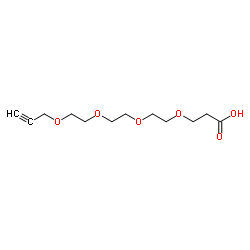Propargyl-PEG4-acid
Modify Date: 2025-08-25 17:27:28

Propargyl-PEG4-acid structure
|
Common Name | Propargyl-PEG4-acid | ||
|---|---|---|---|---|
| CAS Number | 1415800-32-6 | Molecular Weight | 260.284 | |
| Density | 1.1±0.1 g/cm3 | Boiling Point | 388.0±37.0 °C at 760 mmHg | |
| Molecular Formula | C12H20O6 | Melting Point | N/A | |
| MSDS | N/A | Flash Point | 141.0±20.0 °C | |
Use of Propargyl-PEG4-acidPropargyl-PEG4-acid is a PEG-based PROTAC linker can be used in the synthesis of BTK-IAP PROTACs Ibrutinib (HY-10997)-based PROTAC 2 and an analogue PROTAC 3. PROTAC 3 causes BTK degradation with a DC50 of 200 nM in THP-1 cells[1]. |
| Name | 4,7,10,13-Tetraoxahexadec-15-yn-1-oic acid |
|---|---|
| Synonym | More Synonyms |
| Description | Propargyl-PEG4-acid is a PEG-based PROTAC linker can be used in the synthesis of BTK-IAP PROTACs Ibrutinib (HY-10997)-based PROTAC 2 and an analogue PROTAC 3. PROTAC 3 causes BTK degradation with a DC50 of 200 nM in THP-1 cells[1]. |
|---|---|
| Related Catalog | |
| Target |
PEGs |
| In Vitro | BTK-IAP PROTACs act as stoichiometric degraders, resulting in degradation of BTK protein. Degradation of BTK is a result of IAP E3 ligases family recruitment[1]. |
| References |
| Density | 1.1±0.1 g/cm3 |
|---|---|
| Boiling Point | 388.0±37.0 °C at 760 mmHg |
| Molecular Formula | C12H20O6 |
| Molecular Weight | 260.284 |
| Flash Point | 141.0±20.0 °C |
| Exact Mass | 260.125977 |
| LogP | -0.80 |
| Vapour Pressure | 0.0±1.9 mmHg at 25°C |
| Index of Refraction | 1.468 |
| Hazard Codes | Xi |
|---|
| MFCD22683284 |
| 4,7,10,13-Tetraoxahexadec-15-yn-1-oic acid |
| Propargyl-PEG4-acid |